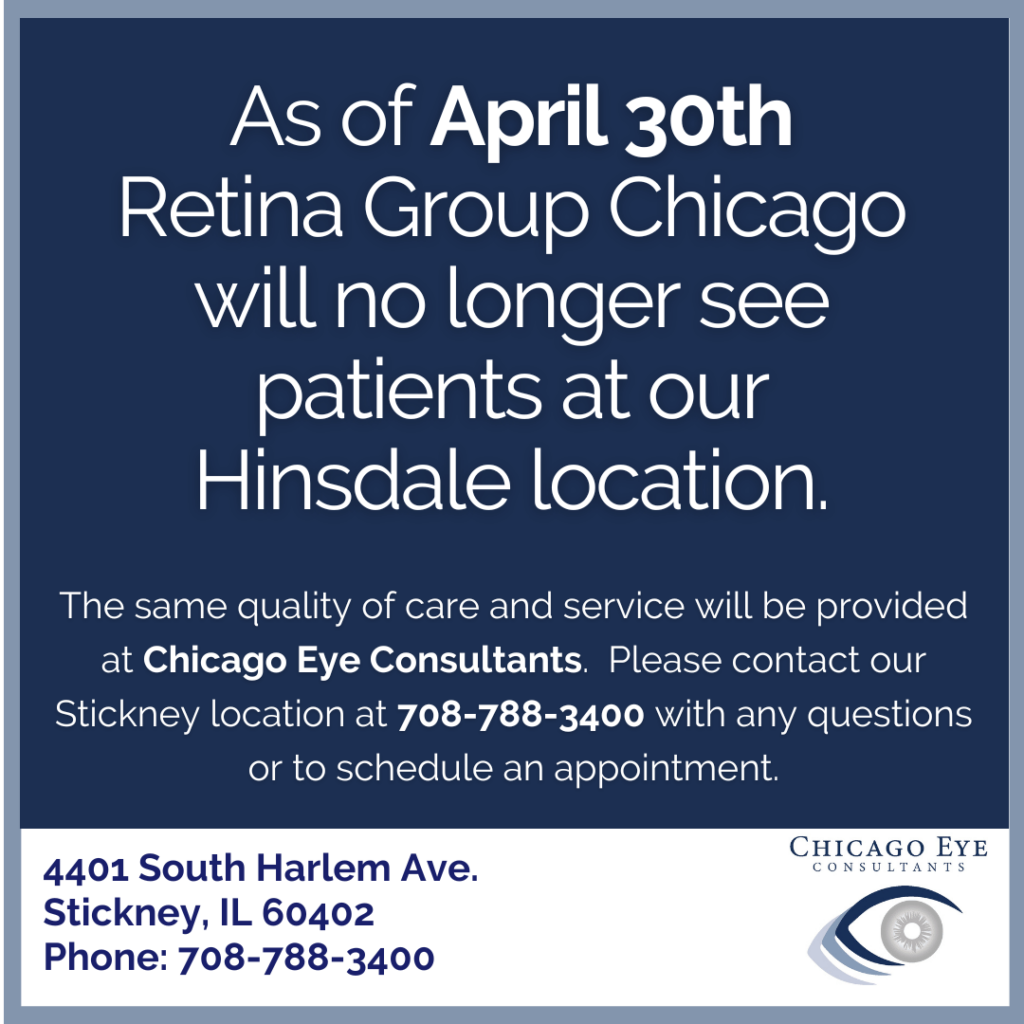Wet vs. Dry Macular Degeneration
Post by: Chicago Eye Consultants

Macular degeneration is a disorder of the retina and the leading cause of irreversible vision loss for people 60 years old and older. An estimated 10 million people will develop this disorder in their retirement years. The macula is a small part of the center of the retina essential for sharp, straight ahead vision. As the macula thins with age, it negatively affects quality of life by diminishing a patient’s ability to read, drive, and recognize faces.
Risk Factors for Macular Degeneration
While age is the primary risk factor for macular degeneration, it is not the only factor that makes individuals more likely to develop the disorder. If you have a family history of age-related macular degeneration (AMD), if you smoke, or if you have been diagnosed with hypertension, you are more likely to develop the disorder.
The Difference Between Wet and Dry Macular Degeneration
There are two types of macular degeneration: wet and dry. Dry age-related macular degeneration (dry AMD) is the early stage of the disorder when the macula thins. Dry AMD is the most common type of macular degeneration, accounting for 80 percent of all cases. Over a number of years, the slow progression of the disorder and atrophy of the macula can cause severe vision loss.
Wet age-related macular degeneration (wet AMD) accounts for the other 20 percent of cases. Wet AMD disrupts the retina differently. Abnormal blood vessels grow beneath the retina and leak blood and fluid into the macula, interfering with central vision. If left untreated, wet AMD creates scarring and vision loss.
Macular Degeneration Signs and Wet Injections
Signs you may be in the early stages of macular degeneration include:
- Partial loss of vision
- Blurred or darkened central vision
- Straight lines appear wavy
- Seeing spots
- Difficulty seeing in dim light
One of the ways doctors screen for AMD is by using the Amsler grid (seen below). Patients are asked to look at a square grid with a dot in the center 12 inches away from their face while wearing reading glasses. As with the traditional eye chart, the patient alternates covering one eye and then the other while using the open eye to stare at the dot in the center of the grid. If blurry spots appear or the lines look distorted, it could be a sign that the patient is developing AMD and you should schedule an appointment with a retina specialist at Chicago Eye Consultants.

If the doctor determines that you have wet AMD, there are several medications that can be injected to stop the bleeding or leaking of the abnormal blood vessels. These drugs are called Anti-Vascular Endothelial Growth Factor (VEGF) drugs and they fall under a variety of brand names, like Lucentis, Avastin, and Eylea. Because of the potential for severe vision loss without treatment, these injections are great news for those suffering from wet macular degeneration.
Dry Macular Degeneration Treatment
Unfortunately, the news is not as good for those suffering with dry AMD. Currently there are no FDA approved treatments for dry macular degeneration. However, there is some promise from the Age-Related Eye Disease Study (AREDS). This clinical trial has shown some strong evidence that certain nutrients may slow the progression of dry AMD. Specific nutrients mentioned include beta carotene, Vitamins C and E, Lutein, and Omega 3 fatty acids. In other words, healthy eating and vitamin supplements could play a role in maintaining lasting vision.
Early Diagnosis is Vital to Prolonging Vision in AMD Patients
The sooner the doctors at Chicago Eye Consultants are able to diagnose macular degeneration, the more likely they will be to delay its progression. Consider the following effects of waiting to schedule a consultation:
- Difficulty reading or watching TV
- Increasing difficulty recognizing faces
- No longer able to drive safely
- More likely to run into or trip over objects
- Greater dependence on others as vision loss progresses
Don’t wait to find out if your vision will improve on its own. At Chicago Eye Consultants we use every possible tool at our disposal to prevent AMD from stealing your vision and independence. Call to schedule an appointment today.
